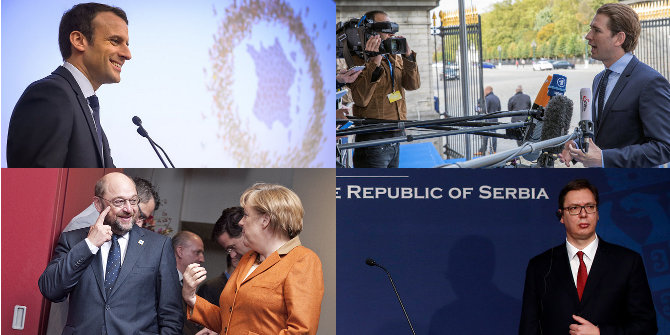Germany is currently exhibiting signs of economic stagnation and low growth. Arvind Ashta asks whether the country could serve as a model for a low-growth future in which EU states pursue a policy of moderation to protect the environment.
The German economy experienced stagnation in the second quarter of 2023, following contractions in the preceding two quarters. These developments unmistakably signal that Germany is grappling with geopolitical pressures.
First, its heavy reliance on Russian oil and gas left it vulnerable when the Ukraine conflict compelled a shift toward more costly American gas sources. This, in turn, escalated costs. Second, as the production of oil and gas by OPEC countries dwindled, energy prices surged further.
Third, geopolitical pressure to distance itself from China impacted Germany from both sides, resulting in reduced imports from and exports to China, a pivotal trading partner. An era of high interest rates has lowered investments. Collectively, these factors have driven down the production of goods in Germany, precipitating an impending recession.
Is low growth a problem?
While the recent economic figures in Germany have generally been portrayed in a negative sense, it is worth asking what Germany’s current trajectory says about wider debates concerning economic growth. Increasing numbers of people are now coming to the conclusion that far from being a problem, low or zero growth may be something to actively aspire to. The goal of such a shift would not be to pursue an austere Spartan existence, but rather to aim for moderation to nurture a healthier planet.
Germany may have assumed a pioneering role in this sense, albeit an unorthodox one, by reducing consumption while enhancing overall welfare. It is noteworthy that the recent surge in support for the Green Party in Germany signifies a political shift toward sustainability.
This seismic shift compels other political parties to integrate green agendas into their manifestos and promises. It necessitates that all political factions prioritise sustainable development, respecting an educated public that has progressively turned away from a growth-centric paradigm. And if individuals are disinclined to pursue growth, government incentives alone will not stimulate consumption.
Germany also seeks to set a global example by demonstrating its ability to welcome immigrants, successfully integrate them and offer them a comfortable life. However, many immigrants in Germany exhibit limited earning power and diminished purchasing capacity. Moreover, remittances sent by some immigrants to their countries of origin contribute to effective demand abroad rather than within Germany. Hence, for these multifaceted reasons, effective demand within Germany may have diminished, potentially resulting in negative growth.
Pathways for collective action
The G20 recently expanded its membership to 21 members with the addition of the African Union. This move implies that, without the African Union’s inclusion, no African nation, except South Africa, would secure representation. In a similar vein, without the European Union’s participation, smaller northern European countries would lack representation.
This underscores the strength derived from collective unions. Federalism, a more robust form of union, bolsters the collective strength of its members. In the realm of global geopolitics, Europe’s perceived weakness often stems from its inability to speak with a unified voice. To fortify their position, European states must stride toward deeper integration, with such steps often taken amid crises.
The developments now taking place in Germany – which many people regard as a looming economic crisis – could serve as a catalyst for such integration. Within Europe, a deeper federal structure could facilitate the swift transmission of sustainability values to all 27 EU member states via regulations and dialogue. It is possible that, like all experiments, there would be numerous missteps and lessons to assimilate. However, the virtue of pursuing a federalist model would lie in its capacity to expedite learning.
For this to occur, the other EU member states would have to make a commitment to supporting Germany in its shift toward sustainability. The notion of extending support to Germany might seem contentious given the country’s reputation for frugality during the Eurozone crisis a decade ago. Yet while Germany was previously hesitant to offer aid to fellow European nations, except for temporary assistance with productivity-enhancing objectives, it has undergone a transformation. The hard-learned lessons from the adverse effects of IMF conditionalities on Greece contributed to this shift.
Notably, during the COVID-19 pandemic, Germany agreed to a €1.8 trillion European bailout package to assist countries in need. This arrangement implied that interest on debts could also be borne by the German populace. A noteworthy advantage of federalism is its capacity to facilitate mutual support among affected nations.
Germany’s support was extended not directly to individual nations like Italy or Spain, but rather as part of Europe collectively providing funding. Consequently, the cost-sharing burden fell upon Germans and other nations capable of sharing more than they received. This is the essence of federalism – standing together during challenging times and offering mutual support.
Promoting cultural and educational exchanges centred on simpler, more sustainable lifestyles could help facilitate mutual learning and cooperation among EU states. The aim of such an approach would be to reinforce European cohesion and promote shared values, transcending national borders to pursue a harmonious and sustainable future.
With the upcoming European elections scheduled for next year, now is an opportune moment for Europeans to contemplate whether they intend to set aside minor disparities and actively promote their values as a beacon for the international community to emulate.
Note: This article gives the views of the author, not the position of EUROPP – European Politics and Policy or the London School of Economics. Featured image credit: European Union





Such an interesting article ! Il shows how far federalism is important and the best solution to takle with économic and societal européen challenges !
Nice paper, full of hope, by an Indian scholar in the European Academy. My congratulations!
Good thought stimulation. Two linked points come immediately to mind. UN SDG 12 and sustainable production and consumption. The production part links to the GDP growth mentioned here. The consumption part would extend the contribution beyond the planet’s heath to human health. If the agriculture sector produces well beyond the the requirements for human consumption for healthy life, then food and drink it get marketed (advertising companies, taste additives etc.) in a way that promotes obesity. At least two research projects for LSE.
We have known about the limits of growth for over 50 years and can now lead a somewhat more modest life with what we have achieved and accumulated in the meantime.